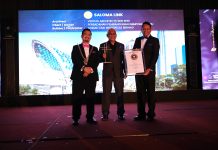Food security is the state of having reliable access to sufficient quantity of affordable food, which at the fundamental level means every individual has a right to have safe and nutritious food to consume. As millions are brought out of poverty across the ASEAN region there is a need to have food security projects on different levels, including the community level.
A healthy life will directly increases productivity which contributes to the nation’s development. The causes of food insecurity varies from agricultural development, population growth, as well as economic downturns which has resulted in reduced global investment in food and agricultural development. This makes food security not just a social issue but a matter of national importance.
Social projects can assist to increase food security across ASEAN by meeting basic needs, finding sustainable solutions and encouraging innovation, below are several notable projects that have created an impact in different communities across ASEAN.
LAOS
The Upland Development in Nonheng or UDIN project is a 5 year plan across 30 underdeveloped villages that are situated in Nonheng District. UDIN project by the European Union funded 80% of the development cost with the amount of €710,267 and HELVETAS Swiss Interco the remaining 20%. This project has successfully promote food security at the 47th poorest district in Lao PDR by sustaining upland agriculture and improved management of forest and aquatic resources. The project completed a construction Gravity-Fed Water supply in 13 villages and 400 household’s latrine construction. Moreover, UDIN project increased human, social and physical capital through numerous efforts such as pesticides training and awareness for the villagers, training for Traditional Birth Attendants and establishing a Community-based Learning Center (CLC).
VIETNAM
Vietnam’s project on Food Security improvement for small scale farmers aims to increase rice yield in mountainous areas in Vietnam and reduce food insecurity due to low income. The Vietnamese government gave a high evaluation due to the success of this project in addressing the issue and solving it. The beneficiaries of this project are 85,745 residents across districts of Tay Giang, Nam Giang and Dong Giang. The catch of this project was educating the villagers with the System of Rice Intensification (SRI) method, which is a techniques that can be used in farming around the mountainous areas. Therefore, numerous activities were provided to ensure the knowledge is spread amongst all farmers such as training on rice cultivation techniques at “Farmers Field School”, setting up and strengthening farmer’s network through workshops and regular meetings and production of SRI technique text books.
THAILAND
Thai food is no doubt a significant and popular cuisine among the foreigners, therefore the Thai government has implement a new policy to strengthen their image in the eyes of the world. Thai Kitchen to the World project aims to promote Thai food products, create awareness of food security concerns and produce high quality foods complying with international standards at a competitive price. Their main strategy is adding value to agricultural produce with high technology production process and expanding agriculture and food business. Other than that, Thailand wants to support Thai investments abroad, especially in building a network of Thai restaurants overseas.
MALAYSIA
Malaysia started its “My Kampung, My Future” under the initiative of the National Blue Ocean Strategy to increase rural youth participation in economic activities and making an impact to the rural economy. The first location for MKMF project started in Kg. Merotai Besar, Tawau, Sabah and Kg. Gendong Simunjan, Sarawak and expanded to Kg. Pulau Tiga, Kg. Gajah, Perak in 2012. In Sabah, Ms. Janariah, owner of a shrimp farm coaches 7 new entrepreneurs’ and started her business with 3 ponds only. It has been reported that she managed to expand her business into 9 ponds with funds sponsored by MKMF and generated an income of RM86,003.40 from January to April 2013. The positive feedback received from this project has prompted the government to consider to expanding to other states such as Kedah, Terengganu and Pahang. My Kampung, My Future will further assist the rural youth entrepreneurs’ and encourage them to stay and develop the agricultural and non-agricultural production in their own village.
INDONESIA
The smart satellite project in Indonesia is led by Inmarsat and partnering with Indonesian Ministry of Maritime Affairs and Fisheries which focus to enhance the safety, productivity and food security of Indonesian Fishers and their communities by expanding the adoption of Vessel Monitoring System (VMS). Moreover, they are also aiming to improve the effectiveness of monitoring and enforcement efforts by regulators through technology and process improvements, resulting in a reduction of illegal fishing activities and greater territorial sovereignty. Fishing sector in Indonesia has been a critical area as there are over 7 million fishers and is a global export business. By using the VMS program, the government hopes to tackle the illegal and unreported fishing that entire value chain.
Moving forward the region will need to continue to have food security projects on the micro or community level which reduces the burden on the overall supply chain, coupled with larger projects which will spur both major investment and sustainable development across the region.
The Malaysia Global Business Forum through the MGBF Food Security Initiative will continue to track key projects that have a direct impact on food security in the ASEAN region. The MGBF Food Security Initiative is a stakeholder lead initiative designed to engage all stakeholders, public and private on a neutral platform to allow the exchange of ideas and capital. For more information visit MGBF Food Security Initiative.





